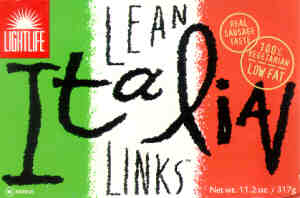 ECO-NAZIS IN THE SYNAGOGUE
ECO-NAZIS IN THE SYNAGOGUE
Washing my hair was my only Tuesday night alternative to the General Meeting. Thanks to a cruel genetic heritage, it would have taken ten seconds. But I'm glad I went. The unusually vital meeting, focusing on genetically engineered food, featured up to 75 members, the buoyant excitement of grassroots activism, and enough bad science to make creationists sound smart.
The two remaining cochairs had dressed their front table with a white cloth to make their bad job look better. But ugly rehashing of old business belied that effort.
First, board member Doyle Warren asked why Ron Pennella of Standart, the former Building Next Door contractor who had been hired by Warren's Project Development Team, had been owed $3,000 by the coop for over a year. "They owe us money," said Generalissimo Joe Holtz, the top coordinator who had dismissed the PDT. Holtz gave two explanations so vague that a cochair had to ask twice for clarification. He finally said that the outstanding invoice wasn't being paid because Standart owed an even greater amount, a $6,000 deposit due on termination of contract.
Then member Erach Screwvala (who often speaks at these meetings; I just can't bear to type his name) reminded coordinator Linda Wheeler that she had agreed to reveal what had been paid board member Electromagnetic Israel for printing. Wheeler backpedaled, saying the amount was so small it didn't qualify as "material information" legally requiring disclosure. But Warren, Screwvala, and coop president/board member/tumor Eric Schneider hammered at her till she said she didn't know. Coordinator Mike Eakin said he would look into the totals.
The first agenda item, a proposal to add the coop's PO box address to its 1977 certificate of incorporation, sparked some debate despite a cochair's plea for us not to "get carried away." Proposer Eric Schneider called the omission a "fatal defect" that meant "we don't really exist now," though he admitted upon questioning that most judges would recognize our existence. Board and Agenda Committee member Melinda Marx asked what would happen if the GM didn't approve this. "Impossible," said Schneider. Impossible or not, we were ready to vote on it, even though Schneider had submitted this as only an agenda discussion. After the chair decided it was indeed a voteable proposal, and we all voted by acclamation that we should indeed vote on it, we all passed it by acclamation -- except for a nay from Marx, and 2 abstentions.
The second agenda item was to approve the hiring of Jessica Robinson, who is now a member of the Building Next Door Renovation Committee, as a full-time salaried coordinator. Actually, we were approving the Personnel Committee's recommendation of her to the coordinators. And the Personnel Committee and the coordinators had each already recommended her to each other. But this is as close as the membership -- the employer of the coordinators -- ever gets to direct hiring.
All who spoke of Robinson (her hair now shortened and feathered to eliminate the Renovation Committee's Mouseketeer look) praised her, but Schneider asked the committee why her candidacy hadn't been mentioned in the biweekly Linewaiter's Gazette. The committee and a coordinator said that there hadn't been enough time, but a cochair (after silencing Schneider, who wouldn't shut up) concurred that a transparent hiring process deserved more notice.
 Member Ethel Merman asked what the terms of Robinson's contract would be, or "is it a life position?" The Personnel Committee chair said "We're not contracting her, we're hiring her. One of the worst things an employee can get is a contract." "Those of us who are unionized would take exception to that," Merman retorted, earning some audience huzzahs. The committee chair said that Robinson would be evaluated after three months, and that the first year was probationary, but that otherwise it was employment until "things don't work out." She did concede that the Personnel Committee was considering how to evaluate the coordinators.
Member Ethel Merman asked what the terms of Robinson's contract would be, or "is it a life position?" The Personnel Committee chair said "We're not contracting her, we're hiring her. One of the worst things an employee can get is a contract." "Those of us who are unionized would take exception to that," Merman retorted, earning some audience huzzahs. The committee chair said that Robinson would be evaluated after three months, and that the first year was probationary, but that otherwise it was employment until "things don't work out." She did concede that the Personnel Committee was considering how to evaluate the coordinators.
"This is one of those great coop situations where everyone is going to vote for Jessica," said member Jerry Whiner. "I don't know why we do these things. In the future, these kinds of things should be eliminated." A couple of audience members whispered "fascism"; the chair again said that transparency was better. Electromagnetic Israel asked whether Robinson, if hired, would still serve on the Renovation Committee, an excellent question that perked up many ears. Robinson said that hadn't been decided yet, and that she didn't yet know the sense of the Personnel Committee or the overall membership on that issue.
The chair called the vote, and Robinson was approved by acclamation followed by applause.
Then came the item we'd all been waiting for, a discussion of genetically manipulated (GM) food. "Any molecular biologists in the crowd tonight?" asked the first speaker, an Environmental Committee member. No hands went up. "I feel much better now," he said, and then launched into a devilifying rant against not only the principles of gene splicing, but even its lab techniques. "Weird chemical processes" took GM beyond Gregor Mendel's humble hybridization of peas, he said. "How they do it is something you probably don't want to know about; it's very scary and weird."
He said that bioscientists claimed that gene splicing is more accurate and precise than old-fashioned cross-pollination. "I can't imagine a biologist getting up in front of this audience and making that statement with a straight face, because it's so inaccurate." To prove his point, he described how genetically altered cells are tagged with antibiotic markers and then exposed en masse to killer bacteria to find the wanted ones. Scientists don't understand why gene insertion is so imprecise, he said; they just throw all those genes in a pool and, somehow, miraculously, "eventually they get results."
Actually, gene splicing works that way because the cells are microscopic and the results are obtained en masse. But the crowd ate it up. Here we were in a rented room in a synagogue, and I felt like I was at a Nazi bund meeting learning about Jewry from the Protocols of the Elders of Zion.
The speaker did get some facts right, such as the risk of allergenic traits from different species being inserted into foods without consumers' knowledge, and how corn altered to secrete a pesticide -- Bt toxin, an insecticide normally produced by Bacillus thuringensis -- can kill not only pests, but also gypsy moths. Otherwise, he dragged the General Meeting into its worst night of unscientific idiocy since February 1996, when a Gazette satiric article announcing a black-hole-powered trash disposal drew members who worried about the black holes' safety and environmental impact.
The next Environmental Committee speaker said that the coop itself would be strengthened by fighting GM foods. Of course, if that fight includes banning affected products from the shelves, the coop would collapse from its lack of inventory, but his grasp of agribusiness politics was miles high above the previous speaker's grasp of basic science.
He noted that Archer Daniels Midland, Heinz, and Gerber were backing away from GM corn and soybeans, and that Frito-Lay, champion of the diarrhea-inducing mock fat olestra, now says it's concerned about GM's impact on public health. To win public support, pro-GM firms like Monsanto, once depending on "secrecy" to infiltrate the food supply, now plan on a big promotional campaign, which he said was akin to "picking up a rock and dropping it on your own foot." He also suggested supporting legislation to ban growing GM crops within state borders.
He closed by suggesting a broad coop campaign that would include a labeling system to warn of GM ingredients. He said it was not practical to ban all nonorganics (organic food, by recent federal definition, excludes GM) because that would impact low-income members. Organic's not cheap. But anti-GM activism would draw in new members, he said.
 During discussion, some members took a harder line against GM products. Another Environmental Committee member, saying he was embracing a raw-foods diet but wanted to cheat with granola, told of finding all coop granolas but one including canola oil (half of the canola crop is GM), and he accused the coordinators of ignoring a past GM resolution to slow the purchase of GM foods. Others were for outright bans because "we're six thousand people, we have power" or because "the coop is my last vestige to feel happy and peaceful." Others supported an education approach to preserve a choice between organic and nonorganic.
During discussion, some members took a harder line against GM products. Another Environmental Committee member, saying he was embracing a raw-foods diet but wanted to cheat with granola, told of finding all coop granolas but one including canola oil (half of the canola crop is GM), and he accused the coordinators of ignoring a past GM resolution to slow the purchase of GM foods. Others were for outright bans because "we're six thousand people, we have power" or because "the coop is my last vestige to feel happy and peaceful." Others supported an education approach to preserve a choice between organic and nonorganic.
A coordinator said that the organic soybean crop is so limited that an outright coop ban on GM foods would wipe out popular dairy products like soy yogurt and soymilk. She also noted that organic food is also big agribusiness -- for instance, Cascadian Farms is owned by the Disney family through Small Planet Foods -- and that a company once able to confirm the non-GM provenance of its ingredients might not be unable to do so another time.
There was great enthusiasm for coop labeling, especially for Electromagnetic Israel's idea of a red-yellow-green system. The antiscience Environmental Committee nut who'd first spoken said that the committee had found found 299 coop products with possible GM taint, but he said it was hard to know for sure, and he claimed to have alarmed an ignorant CEO into contacting his own farmers.
Discussion ranged far beyond GM food's effects on only the coop. A member who had demonstrated at the Seattle World Trade Organization summit spoke of once independent farmers licensing Monsanto seeds tjat they once owned outright, and of farmers even suiciding when the public rejected their GM crops. (My own reading of such news points to farmer depression over debt and drought, not over GM.) She also said Monsanto could own the rights to corn and algae meant to fuel a new age of clean energy, as well as the genetic material for both pharmaceuticals and biowarfare. Another member said that 70 to 80 percent of the world's food is grown by women, who also comprise most of the world's poor, but that agribusiness is a male-dominated industry.
Another member said that though the health impact of GM foods may be debatable, the economics were clear-cut, and that coop education should focus on the latter. Another member suggested passing a series of resolutions "to see how radical the organization is willing to be." An Environmental Committee member said he'd soon present one to make opposition to GM foods an official coop campaign issue, and that the Outreach and Environmental Committees could start a pilot tabling project to pressure "the manager" of Key Food to avoid GM food.
The only positive comment about the Great Satan of bioengineering came after discussion, during the meeting wrap-up. A member said that he could not be opposed to GM because he was genetically engineered, having used a GM drug for Parkinson's disease. A lot of other people on medication, he said, were likely to be genetically engineered too.
![]() Next dispatch.
Next dispatch.
![]() Previous dispatch.
Previous dispatch.
![]() Back to list of dispatches.
Back to list of dispatches.